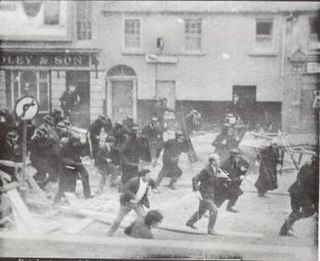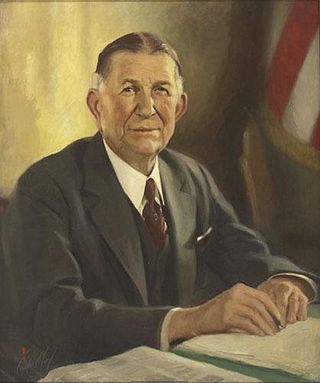
The Lakota are a Native American people. Also known as the Teton Sioux, they are one of the three prominent subcultures of the Sioux people. Their current lands are in North and South Dakota. They speak Lakȟótiyapi—the Lakota language, the westernmost of three closely related languages that belong to the Siouan language family.

Knott County is a county located in the U.S. state of Kentucky. As of the 2020 census, the population was 14,251. Its county seat is Hindman. The county was formed in 1884 and is named for James Proctor Knott, Governor of Kentucky (1883–1887). It is a prohibition or dry county. Its county seat is home to the Hindman Settlement School, founded as America's first settlement school. The Knott County town of Pippa Passes is home to Alice Lloyd College.
Wolf Pen or Wolfpen may refer to:
Dakota, also referred to as Dakhota, is a Siouan language spoken by the Dakota people of the Sioux tribes. Dakota is closely related to and mutually intelligible with the Lakota language. It is critically endangered, with only around 290 fluent speakers left out of an ethnic population of almost 20,000.
Sioux is a Siouan language spoken by over 30,000 Sioux in the United States and Canada, making it the fifth most spoken indigenous language in the United States or Canada, behind Navajo, Cree, Inuit languages, and Ojibwe.
Nakota is the endonym used by those Assiniboine Indigenous people in the US, and by the Stoney People, in Canada.

Free Derry was a self-declared autonomous Irish nationalist area of Derry, Northern Ireland, that existed between 1969 and 1972, during the Troubles. It emerged during the Northern Ireland civil rights movement, which sought to end discrimination against the Irish Catholic/nationalist minority by the Protestant/unionist government. The civil rights movement highlighted the sectarianism and police brutality of the overwhelmingly Protestant police force, the Royal Ulster Constabulary (RUC). The area, which included the mainly-Catholic Bogside and Creggan neighbourhoods, was first secured by community activists on 5 January 1969 following an incursion into the Bogside by RUC officers. Residents built barricades and carried clubs and similar arms to prevent the RUC from entering. Its name was taken from a sign painted on a gable wall in the Bogside which read, "You are now entering Free Derry". For six days the area was a no-go area, after which the residents took down the barricades and RUC patrols resumed. Tensions remained high over the following months.
The border campaign was a guerrilla warfare campaign carried out by the Irish Republican Army (IRA) against targets in Northern Ireland, with the aim of overthrowing British rule there and creating a united Ireland. It was also referred to as the "resistance campaign" by some Irish republican activists. The campaign was a military failure, but for some of its members was justified as it kept the IRA engaged for another generation.
William Woodford was a Virginia planter and militia officer who distinguished himself in the French and Indian War, and later became general of the 2nd Virginia Regiment in the American Revolutionary War, but was captured at the siege of Charleston, South Carolina and died of disease in New York City about six months later aboard a British prison ship.

During 12–16 August 1969, there was an outbreak of political and sectarian violence throughout Northern Ireland, which is often seen as the beginning of the thirty-year conflict known as the Troubles. There had been sporadic violence throughout the year arising out of the Northern Ireland civil rights campaign, which demanded an end to discrimination against Catholics and Irish nationalists. Civil rights marches had been attacked by Protestant loyalists, and protesters often clashed with the Royal Ulster Constabulary (RUC), the overwhelmingly Protestant police force.

Willard Francis Mallalieu was an American bishop of the Methodist Episcopal Church, elected in 1884.
Raymond J. DeMallie was an American anthropologist whose work focuses on the cultural history of the peoples of the Northern Plains, particularly the Lakota. His work is informed by interrelated archival, museum-based, and ethnographic research in a manner characteristic of the ethnohistorical method. In 1985 he founded and became the director of the American Indian Studies Research Institute at Indiana University Bloomington, alongside Douglas Parks, whom he worked collaboratively throughout majority of his career to preserve and translate various Indigenous languages, after having first met in 1980. Shortly after Parks started to work with DeMallie at Indiana University Bloomington. They got married in 2016.

The Belfast Brigade of the Provisional IRA was the largest of the organisation's brigades, based in the city of Belfast, Northern Ireland.

Richard Mallié is a French politician who has served as Mayor of Bouc-Bel-Air since 2014, previously holding the office from 1989 to 2002. He was a member of the National Assembly from 2002 to 2012, where he represented the 10th constituency of Bouches-du-Rhône, as a member of the Union for a Popular Movement (UMP). In 2015, Mallié joined its successor party The Republicans (LR).

Mallie's Sports Grill & Bar is a restaurant, sports grill, and bar located in Southgate, Michigan. It was established in 2005. It is best known for setting the world record of the biggest hamburger commercially available.

Stoney—also called Nakota, Nakoda, Isga, and formerly Alberta Assiniboine—is a member of the Dakota subgroup of the Mississippi Valley grouping of the Siouan languages. The Dakotan languages constitute a dialect continuum consisting of Santee-Sisseton (Dakota), Yankton-Yanktonai (Dakota), Teton (Lakota), Assiniboine, and Stoney.
Malvina French Shanklin Harlan (1839–1916), informally known as "Mallie", was the wife of U.S. Supreme Court Justice John Marshall Harlan, the grandmother of Supreme Court Justice John Marshall Harlan II, and the author of a 1915 memoir entitled Some Memories of a Long Life, 1854–1911. Her memoir remained unpublished until 2001, when it was published at the instigation of Supreme Court Justice Ruth Bader Ginsburg.
Wolfpen, in Mallie, Kentucky, is a historic site which was listed on the National Register of Historic Places in 2014.

The 1936 Florida gubernatorial election was held on November 3, 1936. Democratic nominee Fred P. Cone defeated Republican nominee E.E. Callaway with 80.91% of the vote.












